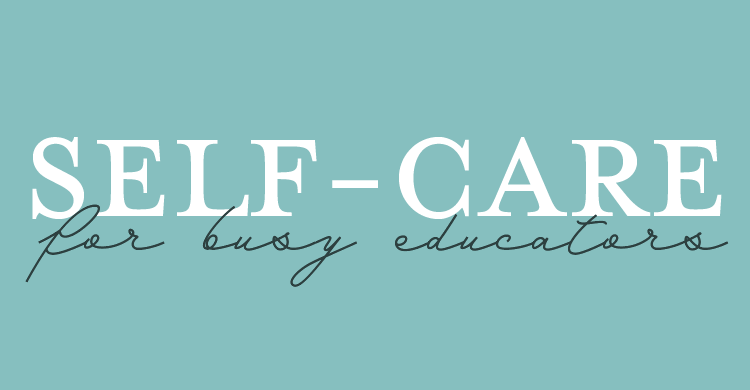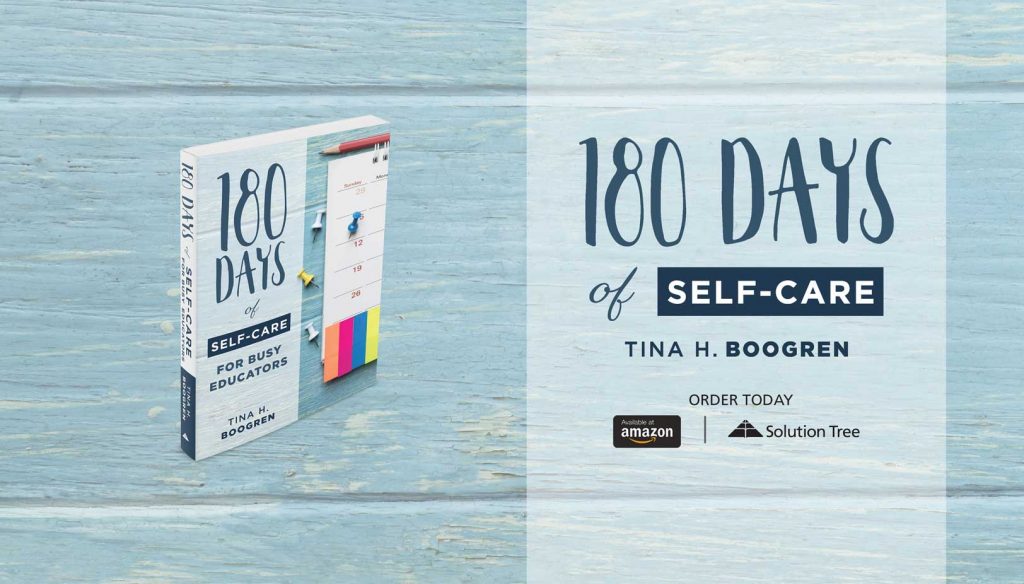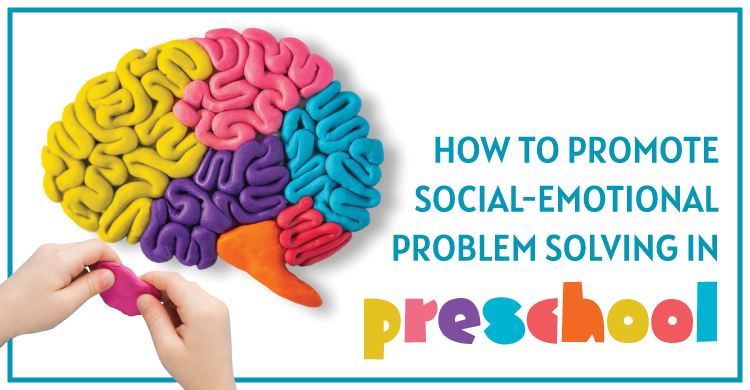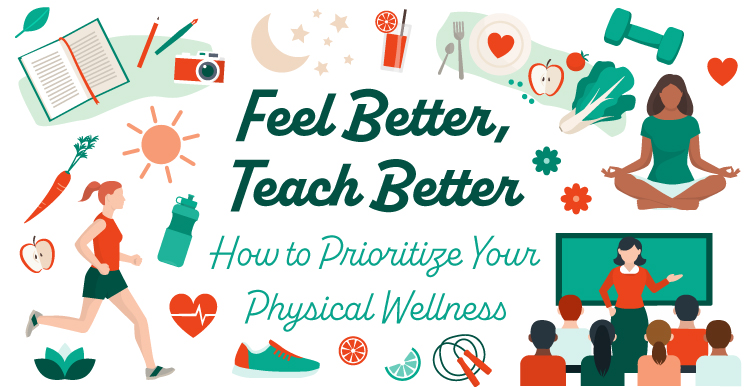Based on 180 Days of Self-Care for Busy Educators
Let me start by painting a picture for you: it’s 2015, and my life is pretty amazing.
I live in the heart of Denver, where we have over 300 days of sunshine and over 80 miles of bike trails within city limits. I have a husband who supports me and loves me relentlessly. I have a puppy who’s astonishingly cute, and I enjoy leisurely brunches with my girlfriends on a regular basis. I also have my dream career. I’m working for Dr. Robert J. Marzano, an educational hero of mine for years, and I’m conducting workshops in cities I’ve never visited before, for educators who inspire me. I’m earning airline miles and status and hotel points, and it’s all so incredible.
Or, to be more honest, that’s the life I’m posting on my social media accounts, and none of that is a lie, but there’s also this hidden truth: I’m actually struggling—right below that shiny surface.
Because the side that wasn’t shared on social media or during brunch or even in private conversations with my husband, was that I was actually sick and unhealthy in ways I’d never been before because during that time. I was also 20 pounds overweight, fighting adult acne that was worse than my middle school years, I wasn’t able to sleep in those hotel rooms in strange cities, and some of the educators that I worked with weren’t in fact inspiring—a few were mean and a couple were mad. At me. For trying to engage them in professional development when they are completely uninterested in improving their practices in any way, shape, or form. (All of which absolutely crushed the people-pleasing Midwesterner in me, by the way.)
The other side of social media
What I posted on my social media accounts was the life I wanted to be living. The reality was that—below that shiny surface—I was actually filled with loneliness, anxiety, and stress, and I handled it all by secretly binge-eating pizza and cheese fries alone in my hotel room, hitting one-click purchasing on Amazon far too often, and making excuses for why I didn’t have room in my carry-on for my workout clothes. I stayed cheerful and energetic during my workshops, but when I arrived back at home, I was irritated and snappy at my husband, and I demanded that I be left alone rather than taking him up on his invitations to date night.
I didn’t share this with anyone. I posted pictures of my sweet puppy on Instagram, and I tagged the locations where I was traveling on Facebook. I was the life of the party at the book club. But the reality was that the thought of prepping for two-day workshops on new material, scheduling my complicated travel, dealing with expense reports and finding time for phone calls with my upcoming hosts sent my anxiety through the roof and thus led to binge-watching Netflix, more purchases, more cheese … more pounds, more pimples, more exhaustion, and more anxiety.
During this time, I had the incredible opportunity to coauthor the book Motivating and Inspiring Students (Marzano, Scott, Boogren, & Newcomb, 2017), where we explored Maslow’s hierarchy of needs and attached strategies to each level of the hierarchy that could be used in schools and classrooms in order to take care of the hearts of all students. Then it hit me: How can we ask our teachers to do all of this for our students when we’re not doing this for ourselves? Or rather, how can I ask teachers to do this for their students when I’m not doing this for myself? As I researched the importance of sleep, nutrition, exercise, safety, self-esteem, and creating a sense of belonging for the book, I found myself shrinking as I realized that all of these basic human needs were being ignored—by me. And by so many of the educators I had the opportunity to work with.
A commitment to care for myself
Thus, I decided to change my life—or at least take my life back and move it closer to the images I was portraying on my social media accounts. It was my singular focus. I started with the basics—level one of Maslow’s (1943) hierarchy. I implemented the research on sleep and purchased an old-school alarm clock and a sleep mask and set the thermostat to 68 degrees. I pushed out my Diet Dr. Pepper addiction by increasing my water intake to 64 ounces each day. I met with a nutritionist, got tested for food allergies, kept a food journal, and completely overhauled my food life in ways that would make my 2015 self cringe. When I was on the road, I opted for the grocery store over the McDonald’s. I carried apples and protein powder in my bag and politely refused the food pushing that comes with travel status.
I had a long and honest talk with my husband. I detailed what a trip on the road actually looked like (let’s just say, there’s nothing glamorous about 99 percent of my trips), and I asked for help. I needed to come home to a clean house and groceries, and I needed to be left alone for a while because my introverted self couldn’t stand the thought of going out to eat in a crowded restaurant for at least 24 hours upon arriving home. I promised that if he could help me with these requests, I would be an extraordinary wife in return. He got it. And he stepped up and took over the cleaning and made sure I had healthy food in the fridge upon returning home from a trip.
I learned how to focus on the workshop participants who were open to my message, and I learned how to let unkind (and unwarranted) comments roll off my back rather than into my head and onto the pizza that I had previously felt inclined to eat after such an interaction.
I packed my tennis shoes and workout clothes in my carry-on, even if that meant ironing the same pair of work pants for three days in a row. I set an alarm to go to bed. I allowed myself two full hours in the morning (even when I was working in the East Coast time zone) and began to meditate and write five unique things I was grateful for, and enjoyed a leisurely breakfast in order to enter into my workday centered. I stopped with the Netflix and began voraciously reading again. I wrote myself permission slips in order to stay true to the healthy boundaries I had established for myself.
And, you guys? It worked.
My skin cleared up, I was sleeping for the recommended seven to eight hours a night (most nights), my weight dropped, and I was a kinder, gentler, more patient presenter, passenger, friend, and wife. I felt so good.
Sharing my story
Because it worked, I was inspired to write my book, Take Time for You: Self-Care Plans for Educators (Boogren, 2018). The results were astounding. My Facebook group went from 100 followers to more than 5,000. I traveled all across the country, conducting workshops that were centered on creating happy and healthy educators, in order to positively impact student achievement. Suddenly, grassroots self-care clubs were popping up in schools. It was incredible. Because I believe in leading by example, I knew I had to continue to walk my talk every single day, and so I continued to research the latest findings on happiness and health, implementing tweaks and habits into my already-established self-care routine in order to fulfill my mission of creating a life that I loved living.
In this continued work, I identified several new “self-care hacks” that I defined as bite-sized strategies that could be implemented easily and quickly as an individual or by an entire faculty, and thus my latest book was born: 180 Days of Self-Care for Busy Educators (Boogren, 2019). In it, I set out to create a resource that would change educators’ lives for the better and in turn, help students as well. I identified simple strategies that had significant research behind them and then figured out how educators could try those strategies for themselves—without taking up too much time or spending too much money. Each week, I present an overarching theme, and then I invite readers to try a few strategies, in order to put the research to the test. At the end of the week, I guide readers to reflect on whether the strategies worked for them, to determine what they’d like to keep doing as part of their daily lives. My hope is that this book will keep this incredible self-care for educators movement in motion, so our schools are filled with inspired, whole, happy, and healthy educators who lead by example for their students.
References
Boogren, T. (2018). Take time for you: Self-care action plans for educators. Bloomington, IN: Solution Tree Press.
Boogren, T. (2019). 180 days of self-care for busy educators. Bloomington, IN: Solution Tree Press.
Marzano, R. J., Scott, D., Boogren, T. H., & Newcomb, M. L. (2017). Motivating & inspiring students: Strategies to awaken the learner. Bloomington, IN: Marzano Research.
Maslow, A. H. (1943). A theory of human motivation. Psychological Review, 50(4), 370–396.
[author_bio id=”1258″]







